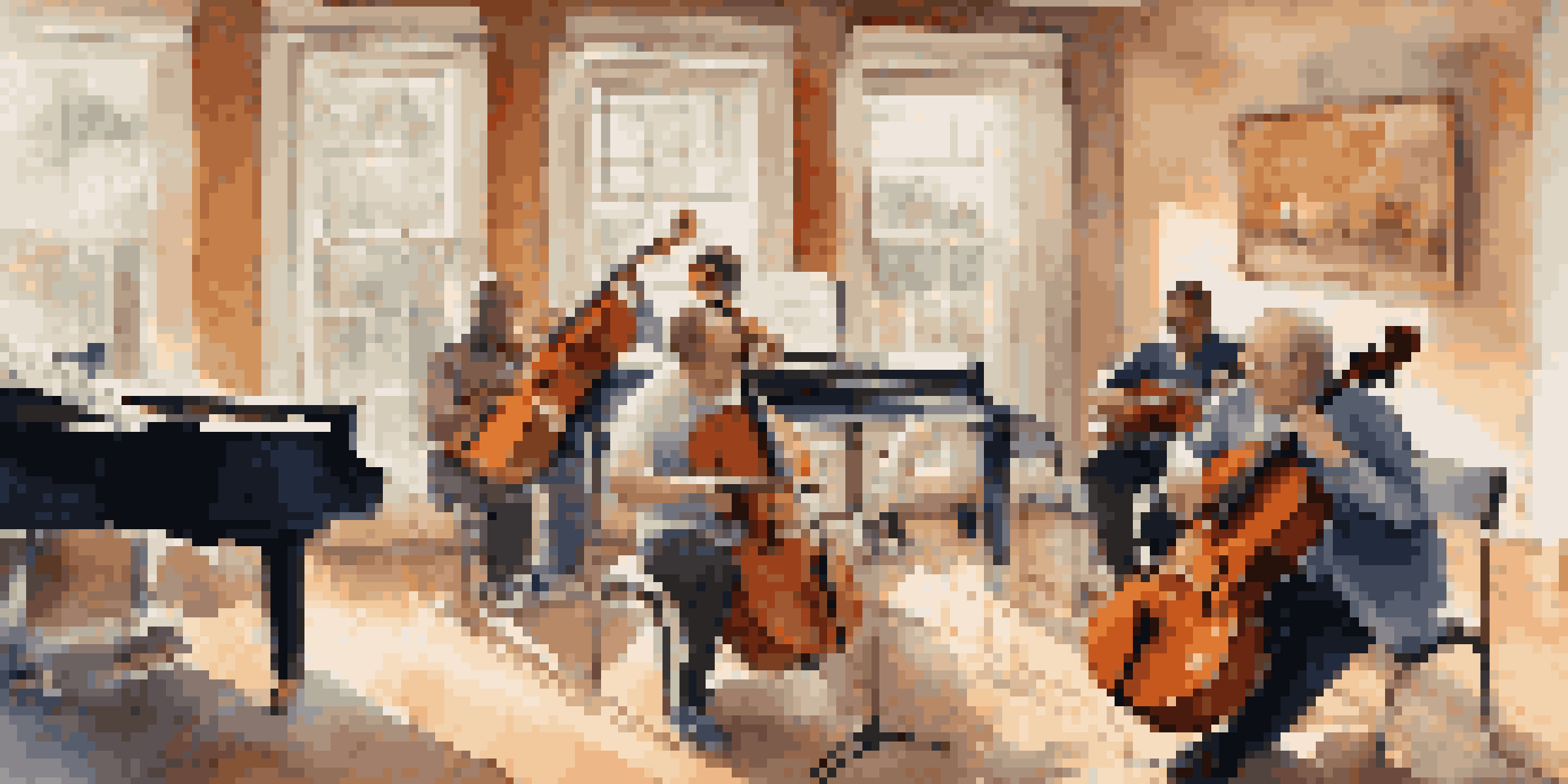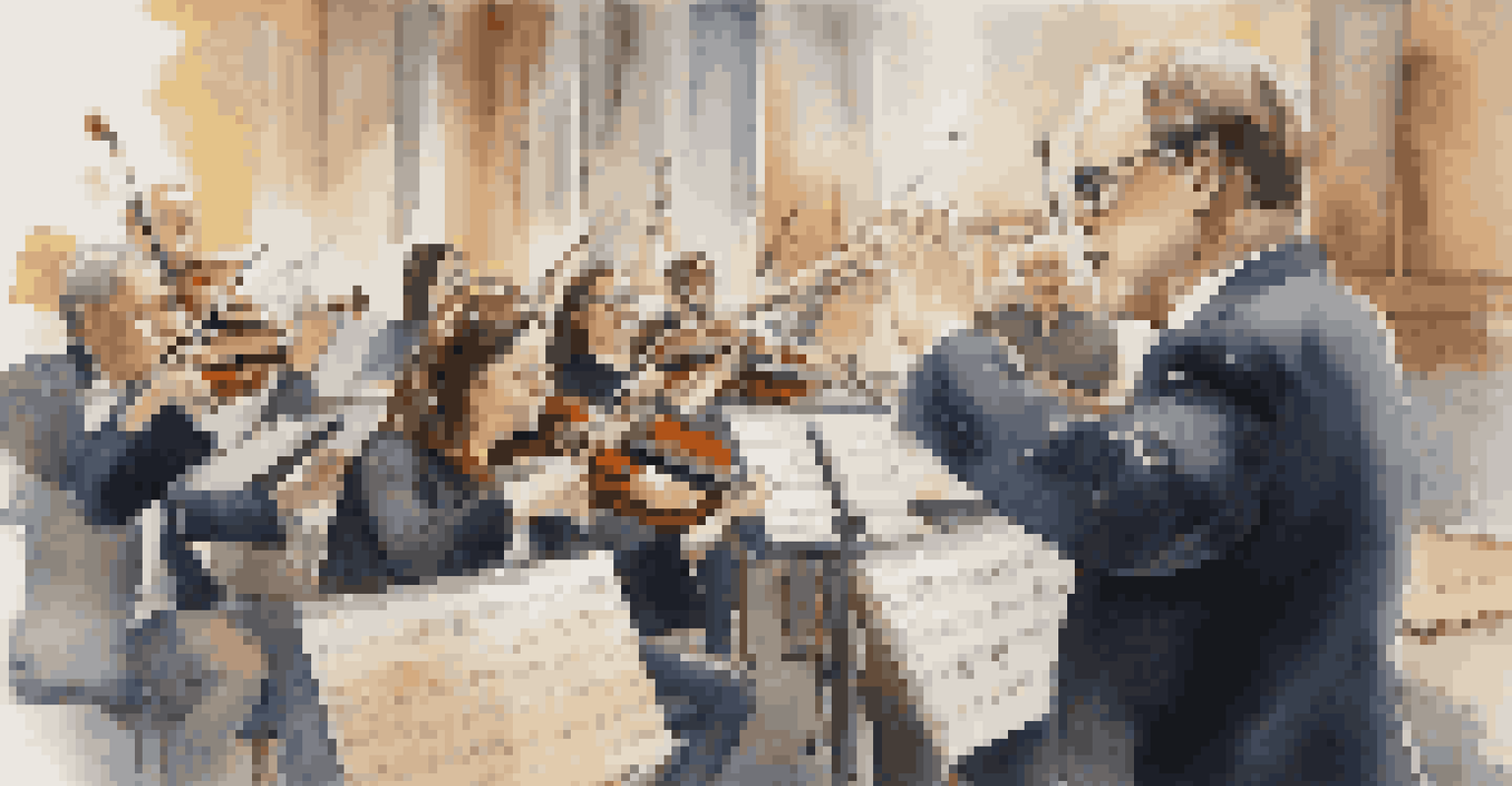The Importance of Rehearsals in Film Scoring Sessions

Understanding the Role of Rehearsals in Film Scoring
Rehearsals in film scoring are the bridge between composition and performance. They allow composers and musicians to explore the nuances of a score before it reaches the final cut. Just like a dress rehearsal before a play, these sessions provide a chance to identify any issues and refine the music.
Rehearsals are the groundwork for collaboration and creativity in music, allowing artists to innovate before the final performance.
In this collaborative environment, everyone can voice their thoughts, making it a space for creativity to flourish. Composers can hear how their music interacts with the film's narrative, and musicians can adapt their playing to match the director's vision. This synergy is vital to achieving a cohesive sound.
Ultimately, rehearsals serve as a rehearsal for success. They create a supportive environment where artists can experiment and innovate, ensuring that the final recording is as polished as possible.
Building Chemistry Among Musicians During Rehearsals
One of the most powerful outcomes of rehearsals is the chemistry that develops among the musicians. When musicians play together multiple times, they begin to understand each other's styles and rhythms. This camaraderie translates into a more harmonious performance, elevating the score's emotional impact.

Imagine a jazz band where each player improvises based on the others' cues. Similarly, during film scoring rehearsals, musicians learn to respond instinctively to one another, creating a dynamic sound that feels alive. This connection is not just about playing notes; it's about creating a shared experience.
Rehearsals Enhance Collaboration
Rehearsals provide a collaborative environment where musicians and composers can refine the score and align with the film's vision.
Moreover, rehearsals allow musicians to provide feedback to one another. They can suggest dynamics or phrasing adjustments, which can enhance the overall performance. This collaborative spirit enriches the music and fosters a sense of community among the artists.
Enhancing Musical Interpretation Through Rehearsals
Rehearsals are a golden opportunity for musicians to interpret the score beyond just playing the notes. During these sessions, they can explore different tempos, dynamics, and articulations, breathing life into the music. This exploration is crucial for capturing the emotional essence of a scene.
The magic of music happens when musicians connect and explore together, turning notes into a shared emotional journey.
For instance, a haunting cue might require a slower, more deliberate pace, while an action sequence might need a quicker, more aggressive interpretation. Through rehearsals, musicians can experiment with these elements, ultimately finding the best fit for the film's mood.
The interplay between the musicians' interpretations and the composer’s intentions often leads to unexpected discoveries. These moments of spontaneity can create powerful musical phrases that might not have emerged without the rehearsal process.
Identifying and Resolving Issues Before Recording
One of the most practical benefits of rehearsals is the ability to identify and resolve any issues before the actual recording. Whether it's a difficult passage that needs more practice or an arrangement that doesn't quite fit, rehearsals offer a chance to address these challenges head-on. This proactive approach can save time and resources in the long run.
During rehearsals, musicians can highlight areas where they struggle or where the score feels disjointed. This feedback loop is invaluable; it allows the composer to make necessary adjustments and ensures that everyone is on the same page. Resolving issues in advance helps maintain a smooth recording session.
Chemistry Boosts Performance Quality
Building chemistry among musicians during rehearsals elevates the emotional impact of the performance.
Additionally, rehearsals can reveal whether the score effectively supports the film's narrative. If something feels off, this is the perfect time to tweak it, ensuring that the music enhances the storytelling rather than detracting from it.
Creating a Comfortable Environment for Musicians
Rehearsals help create a comfortable environment for musicians, which is essential for a successful performance. When musicians feel at ease, they are more likely to take creative risks and express their artistry. This comfort can foster a supportive atmosphere where everyone feels valued and heard.
Imagine walking into a rehearsal space filled with positive energy, where everyone is excited to collaborate. This kind of environment encourages musicians to share their ideas and suggestions freely. The result? A more cohesive and inspired final product.
Moreover, familiarity with the score through rehearsals can ease performance anxiety. Musicians who have rehearsed together multiple times are more confident in their abilities, leading to a more polished performance during recording.
Maximizing Time Efficiency in Recording Sessions
A well-structured rehearsal can significantly maximize time efficiency in recording sessions. By addressing potential issues and solidifying interpretations beforehand, musicians can dive straight into recording when the time comes. This focused approach helps avoid unnecessary delays and keeps the session on track.
Think of it like preparing for a big presentation at work. The more you practice, the smoother your delivery will be. Similarly, rehearsals allow musicians to iron out any wrinkles, making the recording process more seamless.
Rehearsals Save Time and Resources
Identifying and resolving issues during rehearsals leads to a smoother and more efficient recording session.
Furthermore, when everyone is well-prepared, it creates a sense of urgency and purpose in the recording studio. This momentum can lead to a more productive session, ultimately resulting in a high-quality score that captures the essence of the film.
The Lasting Impact of Rehearsals on Final Scores
The impact of rehearsals extends far beyond the recording session; they shape the final score in profound ways. The energy and creativity generated during these sessions often leave a lasting imprint on the music. This collaborative spirit can produce memorable motifs and themes that resonate with audiences.
After all, some of the most iconic film scores emerged from a rehearsal process rich in experimentation and collaboration. When musicians are allowed to explore their interpretations, the music can take on a life of its own, creating a score that is truly unique.

In the end, the effort put into rehearsals not only enhances the quality of the score but also ensures that it aligns perfectly with the film's vision. The result is a musical experience that deeply connects with viewers, leaving a lasting impression long after the credits roll.